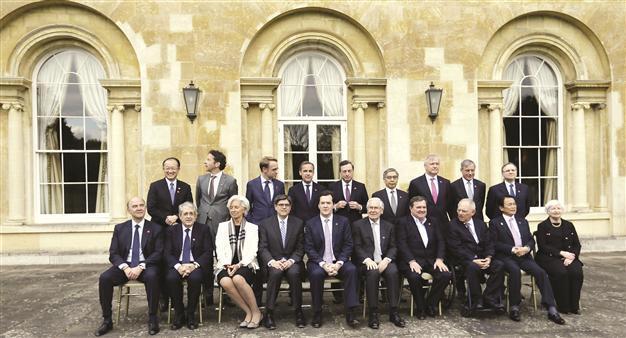G7 smoothes US-EU divisions, agrees on joint currency policy
AYLESBURY, United Kingdom - Agence France-Presse

Finance ministers and central bank governors from the Group of Seven advanced economies pose for a family photo on the sideline of their weekend meeting in Aylesbury, southern England. AFP photo
The Group of Seven advanced economies smoothed over US-European differences at a weekend meeting on how to balance deep austerity measures with ways to support fragile growth.
G7 finance ministers and central bank governors also pledged Saturday their commitment to tackling tax evasion on the second of two days of talks in the English countryside, British finance minister George Osborne said.
The G7 additionally vowed not to intentionally set out to weaken currencies, after the yen on Friday hit its lowest point against the dollar in more than four years.
The United States has put pressure on European nations to scale back their spending cuts amid fears they may harm growth, but Osborne said the meeting in Aylesbury, northwest of London, revealed much common ground.
"This meeting confirmed there are more areas of agreement between us on fiscal policy than is commonly assumed," the Chancellor of the Exchequer told a press conference afterwards.
He said the G7 had "discussed the importance of having in place credible, country-specific, medium-term fiscal consolidation plans for ensuring sustainable public finances and sustainable growth".
French Finance Minister Pierre Moscovici appeared to echo Osborne's remarks.
"The consensus is gaining momentum in the way we balance support for growth and fiscal consolidation," he told reporters.
"There is still a real will to reduce the deficits but certainly there is a change of tone" among G7 members, Moscovici added.
The G7 is meanwhile committed to "nurturing" world economic recovery, said Osborne.
"Overall, our discussions over the past two days have reaffirmed that there are still many challenges to securing sustainable global recovery, and we can't take it for granted," he said.
"But we are committed as the advanced economies in playing our part in nurturing that recovery and ensuring a lasting recovery so that we have prosperity in all our countries." The talks, also attended by top representatives from the European Union and International Monetary Fund, built on last month's wider Group of 20 meeting while looking ahead to next month's G8 summit in Northern Ireland.
The G7 comprises Britain, Canada, France, Germany, Italy, Japan and the United States. The G8 is the G7 plus Russia.
The IMF has welcomed government efforts to cut spending but also urged Britain to lessen the pace of its austerity programme to support the country's fragile economic recovery.
On Friday, US Treasury Secretary Jacob Lew said the world's biggest economy feels "strongly there needs to be the right balance between austerity and growth", amid accusations that Germany has forced heavily indebted eurozone colleagues such as Spain and Italy down a path of deep spending cuts.
The G7 also used its latest gathering to firm up its commitment to combatting tax evasion, which is illegal, and tax avoidance, which occurs when individuals and companies take advantage of legal loopholes.
"Today, we all agree on the importance of collective action to tackle tax avoidance and evasion," said Osborne.
Britain has made the issue a priority of its presidencies of the G7 and G8, and Osborne said: "It is vital that both developed and developing countries collect the tax that is due to them." The G7 also reaffirmed its commitment to reforming financial regulation. "It is important to complete swiftly our work to ensure no banks are too big to fail," Osborne said.
"We also agreed on the need for structural reforms to boost competitiveness of growth, including new trade agreements," he added.
G7 reacts to stock market rallies, yen weaknessThe G7 gathering took place against a background of renewed market focus on currency wars after the yen on Friday hit its new dollar low.
Osborne said the G7 had reaffirmed its commitment made in February that its "fiscal and monetary policies have been and will remain orientated towards meeting" its members' respective domestic objectives and "will not target exchange rates".
The dollar this week vaulted past the key 100-yen barrier for the first time since October 2008, as Tokyo's aggressive stimulus efforts to lift the Japanese economy continue to depress its currency, helping to boost demand for Japanese exports.
"We are not manipulating the foreign exchange market but trying to come out of deflation," Japan's Finance Minister Taro Aso insisted on Friday, when the US currency raced as high as 101.98 yen.
